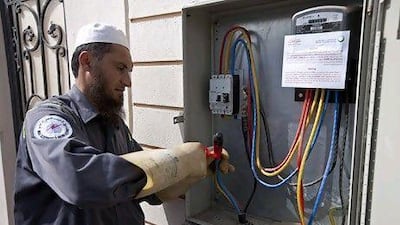Businesses cheered Dubai's decision this week to freeze power and water prices for the next few years.
The move, however, represents an abrupt U-turn in the emirate's energy strategy.
As recently as last month, the emirate's Supreme Council of Energy, a policymaking body, warned that utility tariffs would rise with the cost of fuel.
"Higher prices from 2010 will be passed to the consumers," Nejib Zaafrani, the council's chief executive, told a forum. "The cost of energy counts."
The cost of producing electricity in Dubai hinges on the price it pays for natural gas, most of which Abu Dhabi supplies at subsidised rates through its national oil company and the Dolphin Energy joint venture.
Dubai must buy the remainder on the open market, where international supplies cost about 10 times as much.
The state utility Dubai Electricity & Water Authority (Dewa) already sells electricity and water below the cost of producing it, although there is no agreement on the level of the subsidy.
If gas prices rise and consumers interpret the steady tariffs as a green light to keep their air-conditioning units running at full blast, the gap between the cost of producing power and revenues from selling it will widen. "The option they've got is for they themselves to pay the difference," says Hannes Reinisch, a regional energy consultant at Deloitte in Abu Dhabi.
The announcement comes after other efforts this year to fix the price of food and prescription drugs.
The price freeze signals a shift in Dubai and Dewa, which until this week seemed more eager to operate like a private enterprise.
Dewa pushed forward two price increases, one in 2008 - the first in a decade - and another this year.
It also revived plans for Hassyan, which would be its first public-private power and water plant, and sent representatives abroad to drum up enthusiasm to finance the US$1.5 billion (Dh5.5bn) project. In April, the utility hosted Lloyd Blankfein, the chief executive of Goldman Sachs, to discuss "opportunities for investment in the energy sector".
The credit ratings agency Standard & Poor's acknowledged Dewa's improved financial outlook last year by upgrading its rating of a Dewa bond from junk status.
This week's promise to freeze tariffs raises the question of how Dewa will proceed with ambitious projects such as Hassyan or a modern "clean-coal" plant scheduled to fire up in five years.
Dewa had hoped for companies not only to build the plants, but to take on part-ownership and assist with a chunk of the financing. But investors need to know that every kilowatt of electricity sold to the Dubai grid will get a good return.
The price freeze also places Dubai's renewable energy targets - including sourcing 1 per cent of its power from solar power in the next decade - farther from reach.
The Supreme Council of Energy had agreed to study ways to deploy a subsidy for renewable energy known as a feed-in tariff.
That, plus efforts to cut electricity use by 30 per cent by 2020, rely on raising the price of traditional gas-generated power.
"We are cheaper than the United States. We are cheaper than every country in Europe," Mr Zaafrani said last month. "The most energy-efficient country in Europe has the highest energy cost."
The price freeze could set back Dubai's efforts to reduce its carbon footprint. Another potential loser, however, is Abu Dhabi fossil fuels investment.
The larger emirate has embarked on a $10bn development called Shah that will extract some of the world's most challenging reserves - gas laced with potentially deadly sulphur.
That requires expensive infrastructure to remove the sulphur and turn it into pellets Abu Dhabi hopes to sell.
The task of transporting those pellets from the desert to the coast is part of the logic behind plans for the UAE's first railway.
Such investments require a guarantee of good revenues. If Dubai sits on its power prices long enough, producers such as Abu Dhabi could become less eager to put down the money.

